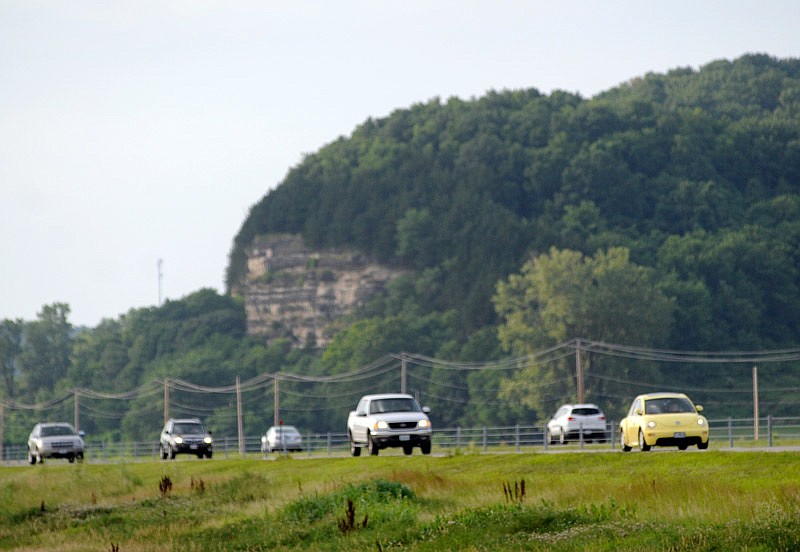COLUMBIA, Mo. - A 9.3-cent increase in Missouri's fuels tax would give the state Transportation Department the same buying power it had two decades ago, state Rep. Kevin Corlew told members of the 21st Century Missouri Transportation System Task Force on Wednesday. This was its ninth meeting since lawmakers created the panel last spring.
"There have been a lot of recommendations across a lot of areas," Corlew, R-Kansas City, said during a discussion session at the end of the meeting.
"The single-most thing that people have recommended in terms of our public meetings has been to take a look at the fuel tax."
Missouri's tax on gasoline and diesel fuels has been 17 cents per gallon since April 1996.
Federal and state figures show Missouri has the nation's seventh largest road-and-bridge system - with nearly 34,000 highway miles and more than 10,000 bridges - but ranks 47th nationally in revenue-per-mile.
Transportation Director Patrick McKenna, who is a task force member, told the panel a tax increase of 10 cents per gallon gasoline would raise approximately $310 million additional money for the state department, plus another $100 million for cities and counties.
Raising the diesel tax by a dime would add another $100 million, he said.
If voters approved that increase, McKenna added, "That would be $2.25 billion of investment over 10 years" just for the state.
Corlew, who chairs the 23-member panel that includes 10 lawmakers, four state government officials and nine citizens appointed by House and Senate leaders and by Gov. Eric Greitens, said that during the task force's nine hearings, "We've learned that Missourians feel like the transportation system is very important for all sectors of their lives - and they also believe we should have a stronger, more reliable system.
"And they're looking for leadership to make sure that we can deliver on that."
He acknowledged many different, competing ideas have been proposed for improving the state's transportation funding.
"The issue has always been, 'How do we pay for that, what is politically viable and what do the people of Missouri feel like they would be willing to support?'" Corlew said.
"That's what we've been tasked with, sifting through the many ideas and being able to, at least, make some recommendations that will help us move forward."
The panel must submit its report to the General Assembly by Jan. 1, and Corlew thinks that can be done.
Committee members will get together again next week in Jefferson City to talk more about what that report should say.
State Sen. Dave Schatz, R-Sullivan, is the panel's co-chair.
"I think we're seeing a consensus of people saying we're talking about it more than we have in the past," he said. "And I think people are beginning to embrace the fact that we're going to have to do something."
Missourians throughout the state have transportation issues, Schatz said.
However, "investment in infrastructure is not 'sexy,'" he said, "but, if people really look at the issue and they understand the need - (but) they don't understand the need until something goes wrong in their neighborhood."
Boone County Presiding Commissioner Dan Atwill urged the panel to support improvements for Interstate 70.
"I imagine we can all agree that this interstate is crucial to our way of life," Atwill noted. "It is the river of commerce of our time," just as the Missouri and Mississippi rivers were major trade routes in the 1800s.
Atwill reminded the panel more than 731,000 people live in the eight outstate counties I-70 goes through.
Add Jackson County, St. Louis City and St. Louis County, and counties like Cole, Moniteau and Osage that border the I-70 counties, he said, and that number climbs to more than 3.8 million people who are "dependent every day" on the traffic that uses I-70.
That's more than 62.5 percent of Missouri's 6.1 million people.
"It's importance cannot be overstated," Atwill said.
Others who testified, including Columbia City Councilman Ian Thomas, urged the panel to make sure Missouri's future transportation plans include non-highway modes - including public bus services, walking and biking trails, airports, railroads and river ports.
McKenna said the task force meetings have been good for understanding "public awareness on transportation issues."
Roads and bridges remain MoDOT's biggest task, and the lack of money to do more than maintain the existing system is hurting Missouri's economy, McKenna said.
"I think we've heard from industry officials in a way that, I think, should be alarming to everyone," he said. "Our great contractors and engineers in this state, who have built this system for us, are going to other states to seek work.
"When they commit to projects (in other states) that are three and four years long - their skilled labor is gone."

